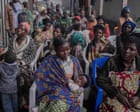
Recent developments in global aid and international humanitarian actions present both challenges and opportunities in addressing crises that transcend national borders. In a series of unfolding events, the United Kingdom and the Gaza region face scrutiny and urgent appeals from global leaders and organizations, highlighting pressing concerns regarding aid distribution and humanitarian relief.
The United Kingdom’s decision to reduce its aid budget from 0.5% to 0.3% of national income has sparked significant discussion and concern among international aid organizations. This decision, driven by a reallocation of funds toward defense spending, is projected to have notable effects on regions reliant on this aid, particularly countries in Africa. The Foreign, Commonwealth & Development Office (FCDO) has issued an impact assessment outlining the likely repercussions of such budgetary changes. A key concern is the potential detrimental impact on children’s education and healthcare in the affected regions. The adjustments could lead to increased vulnerability to diseases and starvation in areas already grappling with economic hardships and health challenges. This decision marks a significant shift in the UK’s stance on international aid, prompting varied responses from political spheres and humanitarian organizations.
Turning the focus towards the Middle East, the Gaza Strip faces one of its most severe humanitarian crises, with international attention being drawn to the critical shortages of essential resources. The World Health Organization’s Director-General, Tedros Adhanom Ghebreyesus, has voiced grave concerns over the situation, describing it as a “man-made mass starvation,” a consequence of the ongoing blockade restricting aid access into the territory. His call has been echoed by over 100 humanitarian agencies, urging for an easing of these restrictions to allow necessary supplies to pass through. The call for action resonates deeply as countless residents in Gaza struggle to meet their basic needs, relying on the flow of humanitarian aid that remains hindered by the current geopolitical situation.
In parallel, the response from the international community continues to evolve. David Lammy, the UK Foreign Secretary, has expressed his disapproval of the ongoing humanitarian challenges in Gaza, denouncing the suffering of innocent civilians. His remarks align with a growing chorus of global leaders advocating for immediate and effective interventions. Yet, as verbal acknowledgments stand, there is anticipation and urgency for these expressions of concern to transition into tangible actions that provide relief and create pathways for sustainability and recovery in affected regions.
These scenarios underscore the interconnectedness of global policies and local realities, highlighting the importance of comprehensive strategies that consider both immediate humanitarian needs and long-term geopolitical implications. As these discussions progress, they present a reflective opportunity for nations to re-evaluate their roles and responsibilities on the global stage, fostering collaborations that prioritize human dignity and resilience.
As the international community grapples with these complex issues, the focus remains on developing solutions that are inclusive, compassionate, and effective. The hope lies in a collective commitment to addressing these emergent challenges with the urgency and collaborative spirit they require, ensuring that aid reaches those most in need and that global policies align with the quest for peace and stability.
Source: {link}
